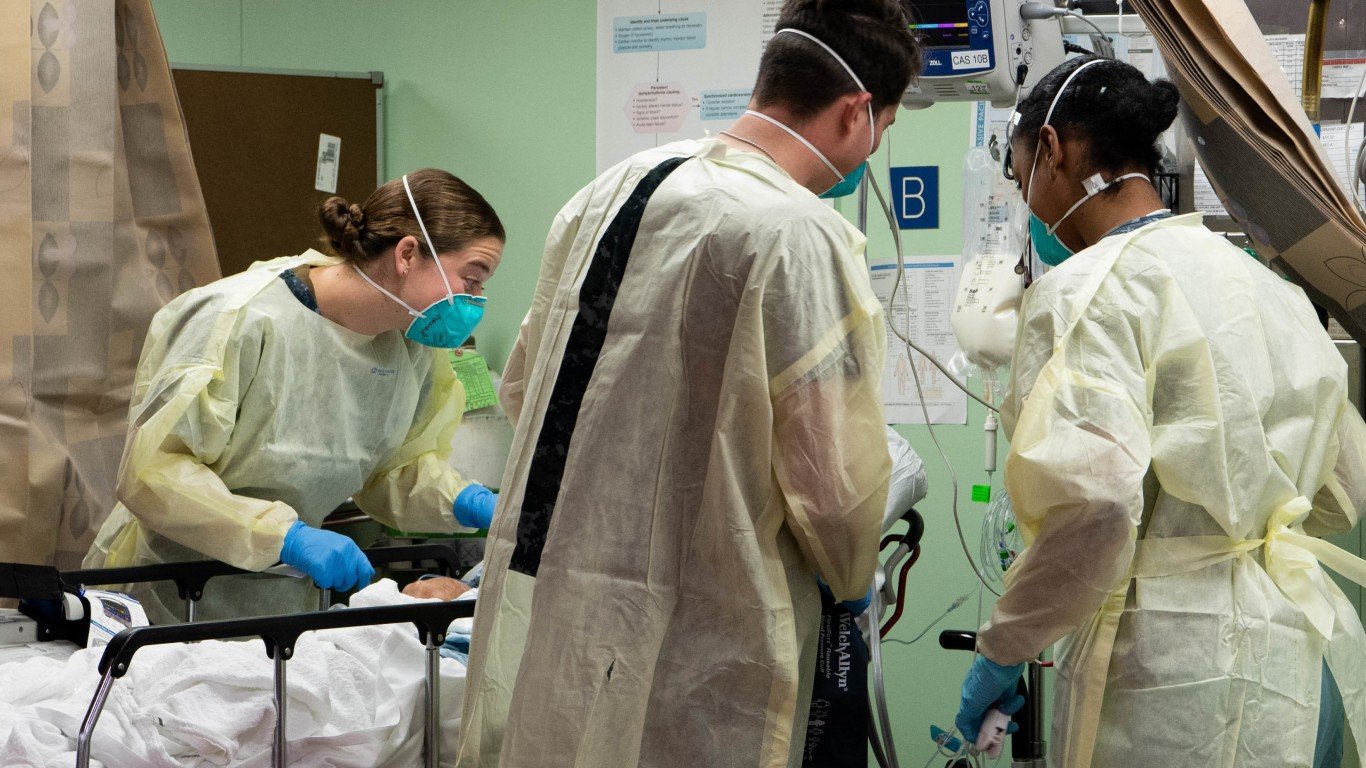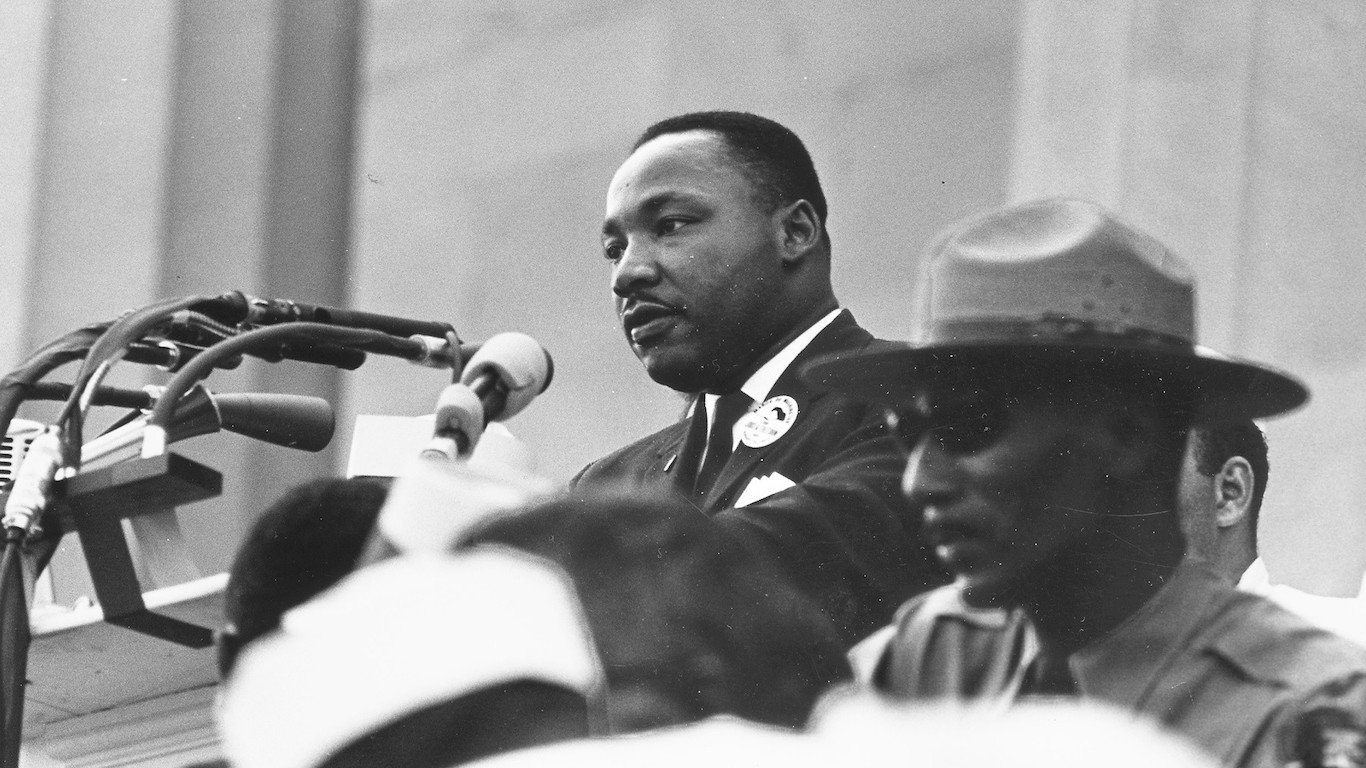

The U.S. reported over 562,000 new cases of coronavirus over the seven days ending May 15, bringing the total count to more than 81.4 million confirmed cases of COVID-19. There have been more than 991,000 COVID-19-related deaths — the highest death toll of any country.
New cases continue to rise at a steady rate. In the past week, there were an average of 22.7 daily new coronavirus cases per 100,000 Americans — essentially unchanged from the week prior, when there were an average of 18.2 daily new coronavirus cases per 100,000 people.
While new data shows that the risk of contracting COVID-19 is high in almost every part of the country, cities continue to be the sites of major outbreaks and superspreader events. Experts agree that the virus is more likely to spread in group settings where large numbers of people routinely have close contact with one another, such as colleges, nursing homes, bars, and restaurants. Metropolitan areas with a high degree of connectivity between different neighborhoods and a large population may be particularly at-risk.
In the 50 largest metro areas, the incidence of COVID-19 grew at an average rate of 26.4 new cases a day per 100,000 residents in the past week — 23.3% greater than the case growth in all counties outside of metro areas.
The Muskegon, MI metro area consists of just Muskegon County. As of May 15, there were 23,296.4 confirmed cases of COVID-19 per 100,000 Muskegon residents, 7.6% lower than the national rate. For comparison, the U.S. has so far reported 25,214.1 cases per 100,000 Americans nationwide.
In order to slow the spread of COVID-19, city and county governments have ordered the closure of thousands of consumer-facing businesses. These measures have led to widespread job loss and record unemployment. In the Muskegon metro area, unemployment peaked at 29.8% in April 2020. As of November 2021, the metro area’s unemployment rate was 7.8%.
To determine how the incidence of COVID-19 in the Muskegon, MI metro area compares to the rest of the country, 24/7 Wall St. compiled and reviewed data from state and local health departments. We ranked metro areas based on the number of confirmed COVID-19 cases per 100,000 residents.To estimate the incidence of COVID-19 at the metropolitan level, we aggregated data from the county level using boundary definitions from the U.S. Census Bureau. Population data used to adjust case and death totals came from the U.S. Census Bureau’s 2019 American Community Survey and are five-year estimates. Unemployment data is from the Bureau of Labor Statistics and is seasonally adjusted.
| FIPS | MSA | Population | Confirmed COVID-19 cases as of May 15 | Confirmed COVID-19 cases as of May 15 per 100,000 residents | Cumulative COVID-19 deaths as of May 15 | Cumulative COVID-19 deaths as of May 15 per 100,000 residents |
|---|---|---|---|---|---|---|
| 13020 | Bay City, MI | 104,104 | 27,496 | 26,412.0 | 588 | 564.8 |
| 24340 | Grand Rapids-Kentwood, MI | 1,062,392 | 278,582 | 26,222.1 | 2,704 | 254.5 |
| 33780 | Monroe, MI | 149,727 | 39,169 | 26,160.3 | 475 | 317.2 |
| 40980 | Saginaw, MI | 191,821 | 50,166 | 26,152.5 | 947 | 493.7 |
| 12980 | Battle Creek, MI | 134,212 | 35,011 | 26,086.3 | 575 | 428.4 |
| 27100 | Jackson, MI | 158,636 | 40,318 | 25,415.4 | 559 | 352.4 |
| 22420 | Flint, MI | 407,875 | 103,601 | 25,400.2 | 1,720 | 421.7 |
| 19820 | Detroit-Warren-Dearborn, MI | 4,317,848 | 1,065,645 | 24,680.0 | 17,492 | 405.1 |
| 29620 | Lansing-East Lansing, MI | 546,772 | 134,051 | 24,516.8 | 1,612 | 294.8 |
| 33220 | Midland, MI | 83,355 | 19,428 | 23,307.5 | 226 | 271.1 |
| 34740 | Muskegon, MI | 173,297 | 40,372 | 23,296.4 | 639 | 368.7 |
| 28020 | Kalamazoo-Portage, MI | 262,745 | 60,792 | 23,137.3 | 675 | 256.9 |
| 35660 | Niles, MI | 154,133 | 35,344 | 22,930.8 | 561 | 364.0 |
| 11460 | Ann Arbor, MI | 367,000 | 82,079 | 22,364.9 | 514 | 140.1 |
Sponsored: Want to Retire Early? Start Here
Want retirement to come a few years earlier than you’d planned? Orare you ready to retire now, but want an extra set of eyes on your finances?
Now you can speak with up to 3 financial experts in your area for FREE. By simply clicking here you can begin to match with financial professionals who can help you build your plan to retire early. And the best part? The first conversation with them is free.
Click here to match with up to 3 financial pros who would be excited to help you make financial decisions.
Thank you for reading! Have some feedback for us?
Contact the 24/7 Wall St. editorial team.



